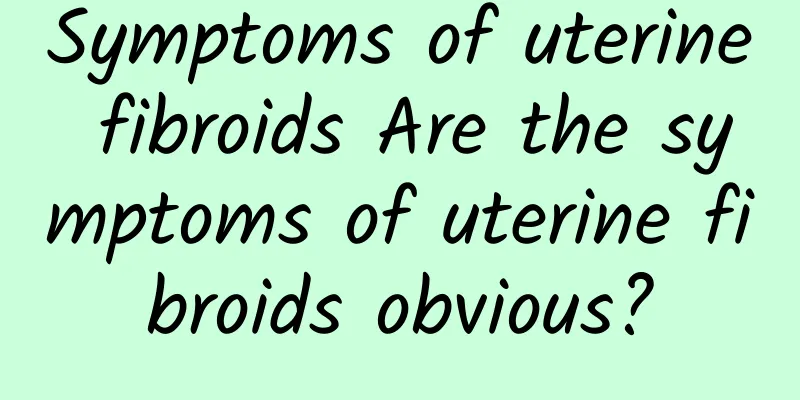Symptoms of uterine fibroids Are the symptoms of uterine fibroids obvious?

|
We should pay attention to abnormal menstruation, excessive or insufficient menstrual flow, which may be caused by gynecological diseases. We should pay special attention to the occurrence of uterine fibroids and go to the hospital for various examinations in time to avoid it from developing to the late stage and bringing some complications, threatening our health. Let's take a look at the symptoms of uterine fibroids. 1. The patient's menstrual cycle changes normally, the menstrual blood volume increases, the menstrual period is prolonged, and the menstrual period is irregular. There may even be irregular vaginal bleeding and heavy bleeding. Tumors such as necrosis or ulceration can discharge pus, blood, or rice soup-smelling fluid. 2. Most patients with uterine fibroids do not feel pain, but a small number of patients will experience lower abdominal pain after fibroid infection or uterine deformation, which is one of the symptoms of uterine fibroids. 3. What are the obvious symptoms of uterine fibroids in women? Generally speaking, when the bladder is full of urine, there will be a lump in the abdomen. Sometimes they can touch it, especially those who have uterine fibroids. This is also a symptom of uterine fibroids. 4. For patients with uterine fibroids, if the fibroids are located low, even if the tumor is not large, it can compress adjacent organs such as the bladder, causing difficulty in urination. If it compresses the rectum, defecation will be difficult. If it compresses the ureter, symptoms such as back pain may occur. 5. During physical examination, the patient may find that the uterus is significantly enlarged and soft. Sometimes there is an infiltrative mass in the pelvic cavity, such as a grape-like sarcoma, which may protrude from the cervix or vagina and is brittle and soft. What are the symptoms associated with uterine fibroids? 1. The patient's menstrual cycle changes normally, the menstrual blood volume increases, the menstrual period is prolonged, and the menstrual period is irregular. There may even be irregular vaginal bleeding and heavy bleeding. Tumors such as necrosis or ulceration can discharge pus, blood, or rice soup-smelling fluid. 2. Most patients with uterine fibroids do not feel pain, but a small number of patients will experience lower abdominal pain after fibroid infection or uterine deformation, which is one of the symptoms of uterine fibroids. 3. What are the obvious symptoms of uterine fibroids in women? Generally speaking, when the bladder is full of urine, there will be a lump in the abdomen. Sometimes they can touch it, especially those who have uterine fibroids. This is also a symptom of uterine fibroids. 4. For patients with uterine fibroids, if the fibroids are located low, even if the tumor is not large, it can compress adjacent organs such as the bladder, causing difficulty in urination. If it compresses the rectum, defecation will be difficult. If it compresses the ureter, symptoms such as back pain may occur. 5. During physical examination, the patient may find that the uterus is significantly enlarged and soft. Sometimes there is an infiltrative mass in the pelvic cavity, such as a grape-like sarcoma, which may protrude from the cervix or vagina and is brittle and soft. |
<<: Symptoms of uterine fibroids How to treat uterine fibroids
Recommend
How to prevent vaginitis?
Treatment of the disease is the key, but the most...
Ectopic pregnancy may be life-threatening
If an ectopic pregnancy is not treated in time, t...
How to abort a month after pregnancy? There are these methods
Some female friends get pregnant unexpectedly one...
What foods are good for adnexitis?
Adnexitis not only troubles women themselves, but...
What factors cause irregular menstruation?
Among women's gynecological diseases, irregul...
Treatments for vulvar itching
How should women with vulvar pruritus be treated?...
What to do with ovarian cysts
What to do with ovarian cysts? Ovarian cysts are ...
How does cervical erosion cause bleeding?
How does bleeding occur under cervical erosion? C...
What gynecological diseases should be prevented after abortion? How to prevent gynecological diseases after abortion?
Abortion is a commonly used method to terminate p...
Women should pay attention to the prevention of uterine fibroids
Uterine fibroids are more common in middle-aged a...
What are the specific methods to prevent threatened abortion?
Many people do not know the specific prevention m...
Experts explain the compression symptoms of severe ovarian cysts
As the ovarian cyst progresses, the patient will ...
What should women do if they are already pregnant with chronic cervicitis? Treatment principles for chronic cervicitis during pregnancy
Many women feel that cervicitis is an inconvenien...
Can’t stand the delicious food? Blood sugar levels to blame
"I really want to eat a piece of chocolate c...
What should I eat after uterine fibroid surgery? How long after uterine fibroid surgery can I have sex?
What should I eat after uterine fibroid surgery? ...









